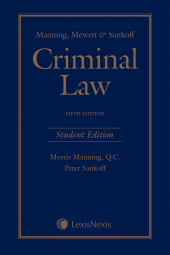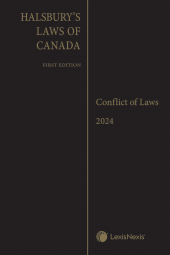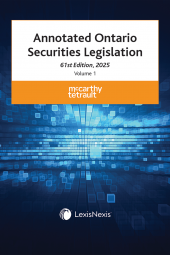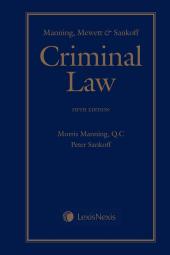Manning, Mewett & Sankoff – Criminal Law, 5th Edition
One Year Subscription Only Terms
Subscribers receive the product(s) listed on the Order Form and any Updates made available during the annual subscription period. Shipping and handling fees are not included in the annual price.
Subscribers are advised of the number of Updates that were made to the particular publication the prior year. The number of Updates may vary due to developments in the law and other publishing issues, but subscribers may use this as a rough estimate of future shipments. Subscribers may call Customer Support at 800-833-9844 for additional information.
Subscribers may cancel this subscription by: calling Customer Support at 800-833-9844; emailing customer.support@lexisnexis.com; or returning the invoice marked 'CANCEL'.
If subscribers cancel within 30 days after the product is ordered or received and return the product at their expense, then they will receive a full credit of the price for the annual subscription.
If subscribers cancel between 31 and 60 days after the invoice date and return the product at their expense, then they will receive a 5/6th credit of the price for the annual subscription. No credit will be given for cancellations more than 60 days after the invoice date. To receive any credit, subscriber must return all product(s) shipped during the year at their expense within the applicable cancellation period listed above.
Product description
Everything You Need to Know About Criminal Law
Canada's premier treatise on criminal law has been thoroughly revised and updated once again. Written by defence counsel Morris Manning, Q.C. and Professor Peter Sankoff, Manning, Mewett & Sankoff – Criminal Law, 5th Edition provides an updated, detailed and critical examination of the criminal law of Canada, from the governing principles of criminal law, to a clear and comprehensive analysis of important offences in the Criminal Code and the Controlled Drugs and Substances Act as well as defences.
Previous editions of this text have been cited repeatedly by the courts at every level including the Supreme Court of Canada and every appellate court. The text facilitates efficient and focused legal research for practitioners, providing them a foundation upon which to build cogent legal argument. The text also provides the judiciary with a comprehensive reference of the existing criminal law and enables them to consider where new developments might be desirable. Thus, it is an essential resource for Crown and defence counsel, the judiciary, academics and students alike.
The new edition has been thoroughly revised to account for the many major developments in criminal law that have occurred since the publication of the previous edition in 2009, including a variety of new offences that did not exist at that time. Similarly, the new edition also provides in-depth expert analysis on the significant changes to criminal law defences which have emerged during the same period, including the new "streamlined" self-defence regime and the Supreme Court's revisiting of the "air of reality" test.
You'll learn how to:
- Understand the scope and weaknesses of Criminal Code offences
- Pursue avenues of effective and persuasive arguments
- Understand the Canadian criminal law within the context of its constitutional framework along with its common law heritage
- Assess the relationships between offences and defences
Consideration of Controversial Topics such as:
- The weighing of circumstantial evidence and measuring the objective components of a defence;
- The usage of the "Air of Reality" Test to deprive the accused of his or her sole defence and to force a defence upon them;
- The obligations imposed by the right to life, liberty and security of the person (under s. 7 of the Charter) upon the State in creating new criminal sanctions;
- In light of the 2013 reforms, when do the various types of self-defence of the person apply?
- The use – or lack thereof – of the vagueness doctrine as a premise for Charter challenges;
- The innocence of the mistake: transferred intent and its inconsistency with the basic principles of criminal liability;
- The definition of the proper scope of sexual assault and the defence of honest belief in consent.
New in This Edition
- Analysis and discussion of the new "stream-lined" self-defense regime instituted by the courts;
- Substantial analysis of the Supreme Court of Canada's multiple re-visiting of the "Air of Reality" test for the ability to successfully raise a defence;
- Coverage of new Supreme Court of Canada decisions on transferred intent in the defense of mistake;
- Discussion of new case law or legislative developments in such areas of identity theft and fraud, sexual offences (including the new legislative framework for prostitution-related offences), motor vehicle offences, weapons offences, strict and absolute liability offences, corporate liability in criminal law and many more;
- Updated analysis of the Canadian Charter of Rights and Freedoms' limitation on criminal law, including discussion of Supreme Court of Canada cases such as R. v. Khawaja, Canada (Attorney-General) v. Bedford and Carter v. Canada (Attorney General).
A One-Stop Reference For:
- Criminal defence lawyers and Crown attorneys who must be able to analyze every criminal offence quickly and in-depth
- Judges who need to make informed decisions about cases involving criminal law
- Law students who need a complete overview of how the Criminal Code operates
Table of contents
PART I: CONSTITUTIONAL CONSIDERATIONS
Chapter 1: The Purpose, Sources and Limits of the Criminal Law
Chapter 2: Limits of the Criminal Law: The Charter of Rights and Freedoms
PART II: GENERAL PRINCIPLES OF LIABILITY
Chapter 3: The Physical Element
Chapter 4: The Mental Element
Chapter 5: Strict and Absolute Liability Offences
Chapter 6: Personal Liability and Parties
Chapter 7: Unfulfilled Offences
PART III: GENERAL PRINCIPLES OF DEFENCE
Chapter 8: Defences – General Observations
Chapter 9: Mistake
Chapter 10: Intoxication: Alcohol or Drugs
Chapter 11: Mental Disorder
Chapter 12: Automatism
Chapter 13: Defences of General Application
Chapter 14: Self-Defence, Defence of Property and Force Authorized by Law
PART IV: SPECIFIC OFFENCES
Chapter 15: Offences Against the State
Chapter 16: Offences Against the Administration of Law and Justice
Chapter 17: Offences Against Public Order
Chapter 18: Firearms and Weapons Offences
Chapter 19: Homicide
Chapter 20: Offences Against the Person
Chapter 21: Sexual Offences
Chapter 22: Theft and Related Offences
Chapter 23: Fraud, Forgery and Other Offences Relating to Trade and Commerce
Chapter 24: Wilful Damage
Chapter 25: Motor Vehicle Offences
Chapter 26: Currency Offences
Chapter 27: Drug Offences
Related products
-
 Manning, Mewett & Sankoff – Criminal Law, 5th Edition – Student EditionRelease date: August 14, 2015$215.00
Manning, Mewett & Sankoff – Criminal Law, 5th Edition – Student EditionRelease date: August 14, 2015$215.00 -
New!Preorder
 Halsbury's Laws of Canada – Conflict of Laws (2024 Reissue)New!Release date: November 29, 2024$335.00
Halsbury's Laws of Canada – Conflict of Laws (2024 Reissue)New!Release date: November 29, 2024$335.00 -
New!Preorder
 Annotated Ontario Securities Legislation, 61st Edition, 2025 (2 Volumes)New!Release date: November 29, 2024$225.00
Annotated Ontario Securities Legislation, 61st Edition, 2025 (2 Volumes)New!Release date: November 29, 2024$225.00
 Lexis Nexis
Lexis Nexis 